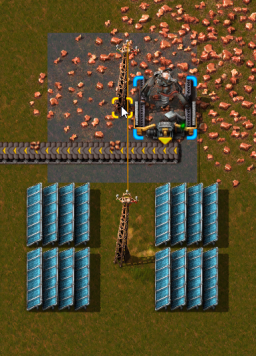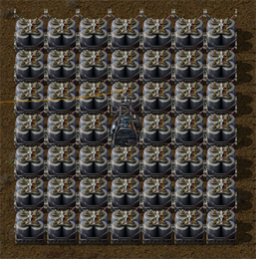Electric system: Difference between revisions
Changed beginner, advanced, expert sections to more appropriate names |
|||
| Line 3: | Line 3: | ||
The '''Electric network''' is used to power a lot of different machines; the game can hardly be played without using [[Electricity]]. Every machine has its own internal electric capacity. When energy is produced, it is evenly distributed to all machines in the network that need electricity. | The '''Electric network''' is used to power a lot of different machines; the game can hardly be played without using [[Electricity]]. Every machine has its own internal electric capacity. When energy is produced, it is evenly distributed to all machines in the network that need electricity. | ||
== | == Creating a new network == | ||
=== Generators === | === Generators === | ||
[[File:electrical-network-example-1.png|thumb|256px|A basic modular power plant.]] | [[File:electrical-network-example-1.png|thumb|256px|A basic modular power plant.]] | ||
| Line 63: | Line 63: | ||
Note, that the timeframe influences the shown detailed production/consumption: the displayed watts is the summed up watts in the timeframe (in the graph below) divided by steps of that timeframe. This means you can see the consumption of radars, even if you mined them meanwhile. | Note, that the timeframe influences the shown detailed production/consumption: the displayed watts is the summed up watts in the timeframe (in the graph below) divided by steps of that timeframe. This means you can see the consumption of radars, even if you mined them meanwhile. | ||
== | == Expanding the player's network == | ||
=== More info === | === More info === | ||
[[File:electrical-network-example-2.png|thumb|256px|High density accumulator array consisting of 48 basic accumulators and a substation providing 240 MJ capacity.]] | [[File:electrical-network-example-2.png|thumb|256px|High density accumulator array consisting of 48 basic accumulators and a substation providing 240 MJ capacity.]] | ||
| Line 82: | Line 82: | ||
This works also from a car or train, which enables you to place the electric poles very quickly! | This works also from a car or train, which enables you to place the electric poles very quickly! | ||
== | == Tips & Tricks == | ||
* [[Electricity/Priority of power Production]] | * [[Electricity/Priority of power Production]] | ||
** [http://www.factorioforums.com/forum/viewtopic.php?f=8&t=4814 Powering sequence] - the order in which accumulators are loaded. This is also about how the electric network orders internally new networks. | ** [http://www.factorioforums.com/forum/viewtopic.php?f=8&t=4814 Powering sequence] - the order in which accumulators are loaded. This is also about how the electric network orders internally new networks. | ||
Revision as of 18:49, 22 March 2016
The Electric network is used to power a lot of different machines; the game can hardly be played without using Electricity. Every machine has its own internal electric capacity. When energy is produced, it is evenly distributed to all machines in the network that need electricity.
Creating a new network
Generators
| Steam engine | The Steam engine consumes heated water to generate energy. Boilers are used to heat water consuming Fuel. Pumps are used to emerge water from the sea. |
| Solar panel | Solar Panels generate a small amount of energy only at daylight. They require a lot of material and research but provide electrical energy without consuming Fuel or producing pollution. |
Storage
| Basic accumulator | Stores and provides electrical energy. |
| Storage tank | Storage tanks can be used to store steam for later consumption by Steam engines. |
Distribution
| Item | Total raw | Coverage area | Own size | Absolute / Effective coverage (in Tile) | Cov. rel. to small el. pole | Wire reach |
|---|---|---|---|---|---|---|
| Small electric pole | 5 x 5 | 1 x 1 | 25 / 24 | 100% | 8 | |
| Medium electric pole | 7 x 7 | 1 x 1 | 49 / 48 | 196% | 9 | |
| Big electric pole | 4 x 4 | 2 x 2 | 16 / 12 | 65% | 30 | |
| Substation | 14 x 14 | 2 x 2 | 196 / 192 | 784% | 14 | |
| Copper cable | Wire reach depends on joined poles | |||||
Connection

For connecting a generator with a consumer both items need to be in a powered area of the same electric network. Electric poles create a covered area of different size around them. If placed close enough two poles connect and form a network. An item is 'connected' as soon as one block is in a covered area. Each electric pole has a GUI providing information about the whole electric network. When hovering a pole you get an overall satisfaction bar in the tooltip.
- Use shift-click on a existing pole to remove its connections to other poles
- Unconnected poles can be connected with a single Copper cable dragging from pole to pole (Right click on the bottom of the pole.)
- You can use place-key (default left mouse) while running/driving, to auto-place poles.
Electric network screen
The Electric network info GUI can be accessed by left-clicking any electric pole nearby.
You can see only the info from the electric network where that pole is connected to! Unlike the production-info (press P) the electric network info is not globally measured, but by network.
- Consumption - What are the current consumption demands. This bar should always be full. Otherwise, it means your production is too low compared to the needed consumption.
- Production - What is the current production amount. This bar should never be full. Otherwise, it means you are at the limit of your power-production.
- Accumulator capacity - How much power is currently held inside of all your accumulators combined in joule. For quick understanding: 1J = 1W * 1sec, see also wikipedia:Joule
- Timespan - Set the time span for the graphs below
- Detailed Consumption - A list of consumers from highest power consumption to lowest. In the picture example, you can see that 2 oil refineries take the most power, at 431 kW.
- Detailed Production - A list of producers from highest power production to lowest. In the picture example, you can see that only 9 Steam engines produce all the electricity in the factory.
- Consumption Graph - Shows the consumption of the different parts of your factory over time. You can choose the timespan as detailed in #4 above.
- Production Graph - Shows the production of the different producers of your factory over time. You can choose the timespan as detailed in #4 above.
Note, that the timeframe influences the shown detailed production/consumption: the displayed watts is the summed up watts in the timeframe (in the graph below) divided by steps of that timeframe. This means you can see the consumption of radars, even if you mined them meanwhile.
Expanding the player's network
More info

The power demand of a network will be fed by power sources in a specific order. If the primary source cannot fully satisfy the demand, additional power is drawn from the second source and so on until no more sources are available. The current order (version 0.9.8) is the following:
With this order in mind, it is common to charge accumulators with Solar panels during the day and to use the stored energy of accumulators overnight automatically.
A newly-placed electric pole will be automatically connected to nearby poles according to the following rules:
- It will be connected to the closest pole available
- It won't be connected to 2 poles connected to each other (ie. it won't form a 3 pole triangle)
- It will be connected to other available poles, starting with the closest ones
Belts and all other entities can be placed in masses by keep pressing the place key, and this works for power poles too: Hold place-key (default left mouse button) to set the first pole. With the button held down, run in any direction. The next pole is placed at the farthest point and connects to the previous, eliminating the need for micromanagement of pole placement.
This works also from a car or train, which enables you to place the electric poles very quickly!
Tips & Tricks
- Electricity/Priority of power Production
- Powering sequence - the order in which accumulators are loaded. This is also about how the electric network orders internally new networks.
- How to switch off steam engines in the night, when enough accumulator capacity is available?
- Electricity
- Liquid
- Units